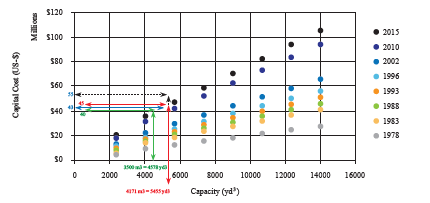Atmospheric and economic impact of LNG fueled Dredging. The Argentine case
DOI:
https://doi.org/10.25043/19098642.221Keywords:
dredging, marine LNG, atmospheric impact, economic impactAbstract
This paper takes a 2021 Argentine case to show the atmospheric and economic impacts of using LNG fueled dredgers in the second largest worldwide operation of its kind about to start in Rio de la Plata. From the emissions point of view, LNG (Liquified Natural Gas) would reduce 23%, mainly those (NOx, SOx and PM) affecting the coastal population health. The use of BioLNG would reduce 99% (60,000 Tons/yr), including as well the planetary impact of CO2 . The economic impact is estimated in savings of 14% of Dredging Cost: 665 Million Dollars (MMUsd), over the 15 years of operation. The origin of these savings is 48% Operational (reduced fuel cost) and 52% external cost mainly due to the reduced impact in Public Health Budget.
Downloads
References
CE DELFT, 2011. External Costs of Transport in Europe”. Delft, CE, The Netherlands.
CIRIA, 2016. A guide to costs and aids for dredging equipment 2009. Construction Industry Research and Information Association, London, UK, 2009, updated to 2016.
J.B de CUYPER, 2014. Smart, Sustainable: a Life Cycle Approach to Fuel Economy as Applied to Dredging Vessels, Terra et Aqua, Number 137, December 2014.
FRITELLI, J. (2019), Harbor Dedging: Issues and Historical Funding. Congressional Research Service, Washington DC, USA, November 2019.
GABRIEL, J., 2016 – Jan Gabriël, Erik van der Blom. Development of dual fuel LNG hopper dredgers, IHC + DEME Presentation, April 2016.
ARGENTINA. HIDROVÍA FEDERAL. Documentos y Estadísticas de la Vía Troncal VTN, DNCPYVN–SSPYVN, avaliable at https://www.argentina.gob.ar/hidroviafederal-2021/informacion-tecnica.
LATINOCONSULT, 2020. Servicio de consultoría para el estudio de factibilidad técnicoeconómica del próximo período de concesión del sistema de navegación troncal - Informe final, Buenos Aires, Argentina, junio 2020.
MERK, O. 2014. Shipping Emission in Ports at International Transport Forum, Paris, France, OECD, 2014.
PIANC, 2010. Climate Change and Navigation. Waterborne transport, ports and waterways: A review of climate change drivers, impacts, responses and mitigation, EnviCom Task Group 3, PIANC 2010.
PODETTI, R. E. (2021), Hidrovía Paraguay-Paraná. Inclusiva, Sustentable y Competitiva, Buenos Aires, Vector Naval de la Facultad de Ingeniería de la Universidad de Buenos Aires, Colección Industria Azul. ISBN 978-987-88-0666-2 - www.industrianaval.com.ar
GIE DRAGAGES-PORTS, 2017. Samuel de Champlain to be First LNG-Converted Dredger. Press Release, 2017.
W. SHI et al., 2015. Application of LNG DF engines in dredging vessels, in CEDA Dredging Days Conference, Holland, 2015.
WOWTSCHUK, B. M. 2016. Production and cost estimating for trailing suction hopper dredge, Texas A&M University, Ocean Engineering Dept, 2016

Published
How to Cite
Issue
Section
License
The authors who publish in this Journal certify that:
- The work submitted for publication in The Ship Science and Technology journal, was written by the author, given that its content is the product of his/her direct intellectual contribution.
- All data and references to material already published are duly identified with their respective credits and are included in the bibliographic notes and quotations highlighted as such.
- All materials submitted for publication are completely free of copyrights; consequently, the author accepts responsibility for any lawsuit or claim related with Intellectual Property Rights thereof, Exonerating of responsibility to The Science and Technology for the Development of Naval, Maritime, and Riverine Industry Corporation, COTECMAR.
- In the event that the article is chosen for publication by The Ship Science and Technology journal, the author state that he/she totally transfers reproduction rights of such to The Science and Technology for the Development of Naval, Maritime, and Riverine Industry Corporation, COTECMAR.
- The authors retain the copyright and transfer to COTECMAR the right of publication and reproduction of the work which will be simultaneously subject to the Creative Commons Attribution License (CC -BY) , which allows the license to copy, distribute, display and represent the work and to make derivative works as long as it recognizes and cites the work in the manner specified by the author or licensor.
- For more information about the Creative Commons Attribution License (CC -BY) and his use and scope, please visit the following web page https://creativecommons.org/licenses/by-sa/4.0/legalcode








